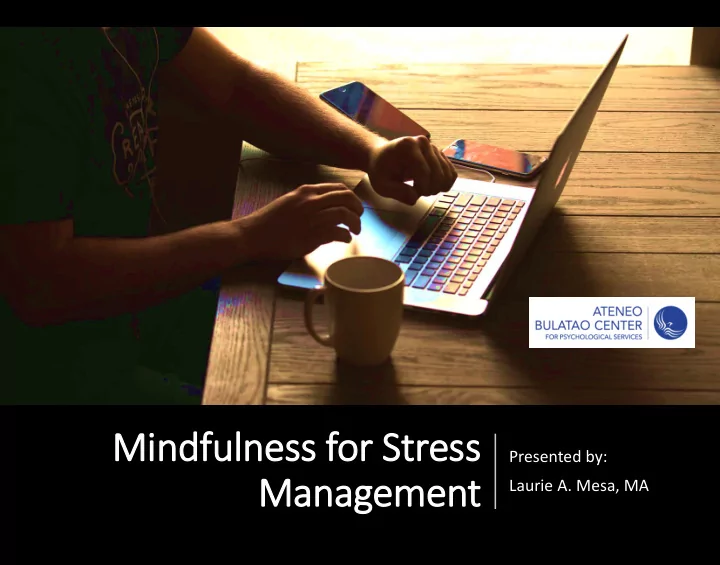

Mindfu fulness for Stress Presented by: Management Laurie A. Mesa, MA
Counseling Testing Research Workshops and Training
1. Stress and our brain 2. Practice Mindfulness Walk- 3. How Mindfulness helps through manage stress
Stressed ka na ba? On a scale of 1 to 10 asan ka na?
Unmotivated /Depressed
Inquiry • How was it for you? • What did you notice? • Did your mind wander?
Key Notes: • Our mind wanders. And it is natural for it to wander. • Helps you see how thoughts have a “mind of its own”. • We may be unaware of our mental activities.
• AMYGDALA: Built-in process for our survival + PRE-FRONTAL CORTEX: goal-setting, planning, higher-order- So what if thinking, self-control • Scan for dangers the mind • Our attention is primed towards wanders? evaluating experiences as threatening. • Sense threat = RUN, FIGHT, or PLAY Uncovering DEAD default • AMYGDALA HIJACK cognitive processes
The brain trying to help.... • Mind search for reference to • predict, • interpret, • Assumes the worst. Makes it urgent • Each mind search/wander, lead to escalating emotions, to PANIC and DISTRESS. • Failing to engage our thinking PFC. • Modern-day fight, flight, play dead responses • And then we get tired, get unmotivated and get low on energy.
Constant distractions and mind wandering can be a source of stress. Trouble is…most of us don’t notice our focus declining until we become completely overwhelmed.
FOCUS: Mindfulness helps manage your wandering mind Helps you pause • and recognize THOUGHTS when mind has drifted away. • Strengthen REACTION EMOTIONS your ability to / IMPULSE Center bring your mind back to breathing. • Eventually the BODY 5 SENSES SENSATIONS mind settles to a calm as you do this.
Paying attention in a particular way on purpose. in the present moment, and non-judgmentally (Kabat-Zinn, 1994, p.4)
Mindfulness is a form of mental training that develops a rather reflective rather than reflexive mode of responding to internal and external events (Shapiro, Carlson, Aston, Freedman, 2006)
By paying attention to the patterns that lead to your lack of focus, you can begin to manage distractions and manage stress.
Mindfulness is key to emotional resilience, which is a key contributor in our ability to quickly recover from stress.
Min indfulness cr creates th the sp space, sh shif ifting b brain activity fr from AUTOMATIC IC reactiv ive amygdala to th the th thoughtful pre-frontal cortex. PRE- DELIBERATE MINDFULNESS Amygdala FRONTAL RESPONSE CORTEX Stimulus PRE- WITHOUT Amygdala FRONTAL MINDFULNESS CORTEX UNCONSCIOUS AUTOMATIC REACTION
Recommend
More recommend